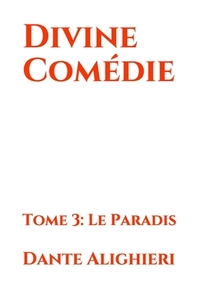Take a photo of a barcode or cover
A classic, but Purgatorio and Paradiso do not hold up to Inferno.
Requires a lot of focus and knowledge of the historical figures mentioned to be anything approaching comprehensible. Personally, I think Overly Sarcastic Productions' video series of it on YouTube does a better job of getting the ideas across while making sense and even being entertaining to a modern reader with a casual interest.
As I am a *cough cough* intellectual, I had already read Inferno once in high school when I chose to pick up the whole Divine Comedy in this, the thirty-first year of my life. However, as teenagers are wont to do, I read the story with approximately zero self-awareness and ploughed through the work without any attention to which translation I was reading, who the characters mentioned in the different circles were, or why this was considered such a profound piece of literature. This time, I decided that I would put in more work to understand what I was reading, and proceed through the entire thing rather than stopping after the most popular portion.
Needless to say, I picked the wrong edition to read when I chose to purchase the Oxford World's Classics version. The translation was fine, though it lacked the poetry that you might expect from an epic poem. That may be a strength for some readers, as it makes it more accessible to those not used to reading poetry or classics in general. I found that it was a strength as far as allowing me to move through the story quickly, but I did at some points wonder what I was missing by choosing a translation that chose clarity over poetry.
Another downside of this particular edition was that all of the notes, of which there were many and which are entirely necessary to the comprehension of this allusion heavy piece, were located in the back of the book. Understandable, since its hard to squeeze so much information in between the prose. But the notes also referenced different lines of text with no indication in the text itself that there was a note pertaining to it. So, I was forced to read through the Canto, flip back to the notes, and then flip back and forth between the canto and the notes ad nauseum until I had connected the line numbers indicated with the words I had already read. This was quite annoying to me, personally, as a reader because I don't want to further complicate an already complicated text with inconvenient flipping back and forth. That is a personal preference, and I'm sure that there are many who would view me as a lazy reader for preferring it to be otherwise, but whatever. I am lazy, so I wanted the notes to be more accessible.
With that said, I purchased a second edition of The Divine Comedy for my Kindle, which included not only a far more poetic translation than the one provided by Oxford World's Classics, but included the notes within the text itself in conveniently clickable points throughout. This was great, but as I had already started annotating Inferno in my physical copy, I decided to continue on with that translation. So that was on me, and any lack of enjoyment I got from that point on is solidly on my shoulders. I will have to reread this at a different time entirely in the more poetic, well annotated version on my Kindle to see if there is anything that I missed through choosing to read it the way that I did.
Editions and translations aside, this book was surprisingly entertaining. I am not a religious person, and the concept of the Christian Hell, Purgatory, and Heaven don't resonate with me on a personal level, but I found myself considering my own spirituality a lot throughout the reading of this book. Inferno is a fantastically horrifying depiction of Hell; the painful imagery of people submerged in boiling blood, people violently beaten by unrelenting wind, and trees weeping as their limbs are torn from them. It is also interesting as an insight into Dante himself, and what he viewed as sins unforgivable. The placement of historical figures within the context of his versions of the afterlife show how he felt about certain things.
Purgatorio, surprisingly, was my favorite of the three as it provided a unique experience of making me consider my own life. At this point I feel that the story is at its most poetic, the sinful people who are working their way toward heaven faced with punishments that mirror their sin in a metaphorical way. It was interesting to view these sections of Purgatory and consider the ways each of these sins present themselves in me. I am and have been wrathful or greedy or envious or proud at multiple instances in my life, and will be again. This particular book of the Comedy made me consider those behaviors and see the ways that I am hurting myself through them.
Paradiso, though, is where the whole thing fell flat. The concept of Heaven wherein everyone is smiling and happy and unquestioning may sound appealing in theory, but reads incredibly dull. I was not impressed with that final aspect of the Divine Comedy and think that in the future, when I reread this, I will just focus on the first two sections.
Needless to say, I picked the wrong edition to read when I chose to purchase the Oxford World's Classics version. The translation was fine, though it lacked the poetry that you might expect from an epic poem. That may be a strength for some readers, as it makes it more accessible to those not used to reading poetry or classics in general. I found that it was a strength as far as allowing me to move through the story quickly, but I did at some points wonder what I was missing by choosing a translation that chose clarity over poetry.
Another downside of this particular edition was that all of the notes, of which there were many and which are entirely necessary to the comprehension of this allusion heavy piece, were located in the back of the book. Understandable, since its hard to squeeze so much information in between the prose. But the notes also referenced different lines of text with no indication in the text itself that there was a note pertaining to it. So, I was forced to read through the Canto, flip back to the notes, and then flip back and forth between the canto and the notes ad nauseum until I had connected the line numbers indicated with the words I had already read. This was quite annoying to me, personally, as a reader because I don't want to further complicate an already complicated text with inconvenient flipping back and forth. That is a personal preference, and I'm sure that there are many who would view me as a lazy reader for preferring it to be otherwise, but whatever. I am lazy, so I wanted the notes to be more accessible.
With that said, I purchased a second edition of The Divine Comedy for my Kindle, which included not only a far more poetic translation than the one provided by Oxford World's Classics, but included the notes within the text itself in conveniently clickable points throughout. This was great, but as I had already started annotating Inferno in my physical copy, I decided to continue on with that translation. So that was on me, and any lack of enjoyment I got from that point on is solidly on my shoulders. I will have to reread this at a different time entirely in the more poetic, well annotated version on my Kindle to see if there is anything that I missed through choosing to read it the way that I did.
Editions and translations aside, this book was surprisingly entertaining. I am not a religious person, and the concept of the Christian Hell, Purgatory, and Heaven don't resonate with me on a personal level, but I found myself considering my own spirituality a lot throughout the reading of this book. Inferno is a fantastically horrifying depiction of Hell; the painful imagery of people submerged in boiling blood, people violently beaten by unrelenting wind, and trees weeping as their limbs are torn from them. It is also interesting as an insight into Dante himself, and what he viewed as sins unforgivable. The placement of historical figures within the context of his versions of the afterlife show how he felt about certain things.
Purgatorio, surprisingly, was my favorite of the three as it provided a unique experience of making me consider my own life. At this point I feel that the story is at its most poetic, the sinful people who are working their way toward heaven faced with punishments that mirror their sin in a metaphorical way. It was interesting to view these sections of Purgatory and consider the ways each of these sins present themselves in me. I am and have been wrathful or greedy or envious or proud at multiple instances in my life, and will be again. This particular book of the Comedy made me consider those behaviors and see the ways that I am hurting myself through them.
Paradiso, though, is where the whole thing fell flat. The concept of Heaven wherein everyone is smiling and happy and unquestioning may sound appealing in theory, but reads incredibly dull. I was not impressed with that final aspect of the Divine Comedy and think that in the future, when I reread this, I will just focus on the first two sections.
challenging
informative
inspiring
mysterious
reflective
slow-paced
Plot or Character Driven:
Plot
Strong character development:
Yes
Loveable characters:
Yes
Diverse cast of characters:
Yes
adventurous
dark
fast-paced
Gray's translation is fast and readable, but lacks the gravitas I expected. The poem itself is vain and egotistical, and I remain baffled at the cruelty of the Christian mythos Dante endorses.
Interesting imagery, will need to read it again someday.
I just didn't like the earthiness and stripped-down-ness of the translation text. Only read Inferno as of yet, and not planning to finish the trilogy anytime soon.
My man Dante really wrote a self insert fanfiction of the bible but also placed his fave historical figures just so he could praise and roast them... I-
- college freshman who had to read it but also kinda enjoyed it
- college freshman who had to read it but also kinda enjoyed it
Can u believe a random bard was just like “I know what hell and purgatory are like bc I went there with this famous dead poet who became my best friend and he was sent to me by this girl I love who then travelled with me through heaven I understand everything now :)” and he turned the Church - who say all we know about heaven is that it’s unity with god and all we know of hell is that it’s absence from god - completely on its head by making the most popular depiction of hell also completely biblically inaccurate? Iconic behaviour we have to stan







